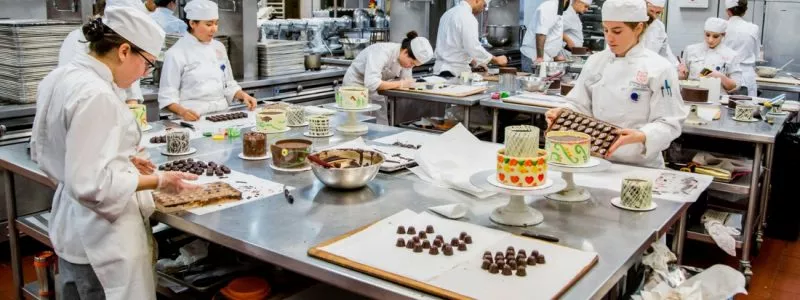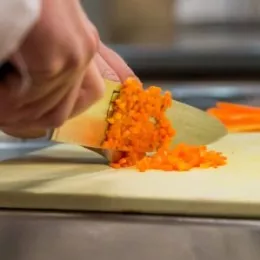For those aspiring to become a pastry chef, choosing an immersive pastry education through a culinary school like International Culinary Center (ICC) will help you build the foundation of baking fundamentals of your career. From the beginning of class on the first day through graduation, get a glimpse into what it’s like to study as a Professional Pastry Arts student in the ICC kitchen.
BEFORE PASTRY CLASS: STARTING THE DAY
Preparation is one of the keys to success in the kitchen — even for aspiring chefs starting out in their pastry education. On the first day of class, ICC students are in the kitchen, in their chef’s whites, ready to bake. Each day from then on, students are expected to review the lesson plan for the day and prepare the tools necessary for the day’s recipe. The process of “mise en place” — or the proper placement — for everything in the kitchen work space laid out in advance plays an important role in baking and pastry students learning the discipline necessary to be an efficient chef.
ONCE YOUR PASTRY CLASS BEGINS
Daily classroom instruction in the ICC pastry kitchen begins with a brief lecture, summarizing key vocabulary and objectives of the day’s dishes, followed by the first demonstration led by the chef-instructor. Demonstrations show students techniques they will need for the recipe that follows, while also providing an opportunity to ask questions before trying the techniques on their own.
Students then return to their own stations to recreate the demonstrated recipe, using multi-tasking, organization and teamwork in learning to navigate the kitchen environment. The chef-instructor helps students around the kitchen by providing feedback, answering questions and pointing out important details.
A typical day in the pastry arts program is broken down into three to four recipes or projects, each including its own chef demonstration and techniques. Some recipes — like cakes and pies — may contain several components including baking, cooling, filling and decorating. More complex recipes may therefore span more than one demonstration.
Director of Pastry Operations Jansen Chan — who has worked in the pastry kitchen of Alain Ducasse at the Essex House in NYC and served as the executive pastry chef of Michelin-starred Oceana — describes the pastry kitchen environment as bustling, at times chaotic, but above all else, supportive.
“Chef-instructors walk you through every step. There is lots of support in the classroom, and the instructors want you to succeed — it’s a safe place to learn.” – Jansen Chan, Director of Pastry Operations
By following the carefully constructed lesson plans, students learn the timing of recipes and processes firsthand. Over the course of the program, students complete hundreds of recipes covering a range of baking skills, including everything from doughs and breads to fruit compotes and more advanced chocolate work.
PASTRY PROJECTS AND MORE
While the first half of the program is designed to help students learn and master skills essential to becoming a pastry chef, the second half cultivates students’ creativity and personal style, matched with their new skills. Some of the projects students complete include a three-tiered wedding cake, chocolate sculptures, a final showcase for friends and family — called “Restaurant Day” — and more.
As part of the “Play with Your Food” blog series, recent graduate Nick Wuest described two lessons he learned from his ICC education:
“The first is that pastry has a ton of rules. The scientific foundation required is immense. The second is that all of those rules can be bent or broken. With some creative thinking anything is possible!” – Nick Wuest, Professional Pastry Arts alumnus, now a Pastry Cook at American Cut.
FIELD TRIPS TO BAKERIES, SHOPS AND RESTAURANTS
During the course of the program, students can participate in industry field trips to a location, where they can meet chefs, ask questions and see the skills and techniques they’ve learned in action.
Chefs at participating patisseries walk students through the kitchen and show them how it functions — from ingredient preparation to plating to delivery. Taking these field trips not only provides a networking opportunity for students, but also allows them to experience a professional kitchen space in person.
Recent locations for pastry field trips include Oceana, Ron Ben-Israel Cakes, Dominique Ansel Kitchen, and ICC Dean Jacques Torres’s chocolate factory Jacque Torres Chocolate.
This blog post was originally published by the International Culinary Center (ICC), founded as The French Culinary Institute (FCI). In 2020, ICE and ICC came together on one strong and dynamic national platform at ICE's campuses in New York City and Los Angeles. Explore your pastry education where the legacy lives on.



